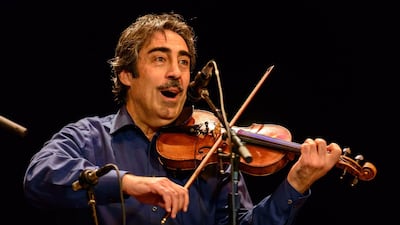The Arabic Music Retreat is on its way to the region. The week-long event has been running for 26 years in the US, mentoring generations of Arab musicians through intensive workshops, lectures and performances by esteemed musicians and academics.
One of which is the retreat's founder, Simon Shaheen, a Berklee College of Music instructor and acclaimed composer, oud player and violinist.
The Palestinian-American confirmed to The National that discussions are under way to bring the event, which will next be held in August in Massachusetts, to the Mena region.
"It is in the making and it will happen," says Shaheen, who is performing at The Arts Centre at NYU Abu Dhabi on Friday as part of its Ramadaniyyat concert series.
"I have been approached by people from Lebanon, Palestine, Morocco and Egypt. It's really a matter of being patient and waiting as soon as this Covid-19 phenomenon moves on and we go back to our normal functions.”
A show with a purpose
If it eventuates, not only would it be a milestone for the Arab world’s musical landscape, one already adorned with leading UAE institutions such as the NYU Abu Dhabi's The Arts Centre and Berklee Abu Dhabi, it would also serve as a continuation of Shaheen’s quest to build bridges between the Arabic and western music worlds.
To do that, however, listeners and musicians need to expand their notions of what those sounds are, believes Shaheen.
This forms the basis of his show, which he hopes can be as revelatory.
The repertoire includes works by traditional 20th-century Arabic composers and singers such as Syrian-Egyptian Farid El-Atrash and Egyptian singer Mohamed Fawzi, plus the Syrian poetic form of muwashshah.
"We need not be held hostage by the term 'traditional' as it can also be very creative, too. It's not something that is only in the past tense and which is old. This is where many people misinterpret the music," he says.
"So I will be communicating with the audience from the stage, not in order to throw a joke in or something.
“There is an educational aspect here, in that I will provide a few words or phrases in describing a piece of music or a song in order to make their listening more vital.”
A new interpretation
It’s the same approach Shaheen takes when performing and working in North America.
After earning degrees in Arabic literature and music performance at Israel's Tel Aviv University, Shaheen emigrated to the US in 1980 to study at New York’s Manhattan School of Music.
His quest to fuse both disciplines, through solo and ensemble recordings with the band Qantara and composing works with the Detroit Symphony Orchestra and Chicago Sinfonietta, made him a pioneer in bringing Middle Eastern music to US audiences and cultural institutions.
A memorable experience, Shaheen recalls, was working with the Detroit Symphony Orchestra in 2008, where he presented an oud concerto.
"I tried to educate the musicians about certain kinds of rhythms and musical intervals and modes.
“I also tried to make them understand how to feel the phrasing of Arabic music and basically interpret things in a way other than what they are used to,” he says.
“It was a fantastic and powerful process and it made a difference in the eventual performance.
“When you get great musicians who are open enough and being capable of taking part in something that is out of their practice, it enhances the expression and interpretation of music.”
Bringing Arabic music to the masses

To address the rising violence against Arab-Americans in the wake of the 9/11 terrorist attacks, Shaheen took part in the Oasis of Peace tour, produced by Lebanese-American composer Dawn Elder, starting on September 15 that year in Chicago and finishing in New York in December.
“A lot of us Arab-Americans in the US at the time had this feeling of living in limbo and I remember telling my agents to give me as many concerts as I can because we need to show ourselves and have a presence. I realised I needed to continue my performance workshops, residencies and music education with even more intensity,” Shaheen says.
“When I came to the US in 1980, there was no presentation of Arabic music in any of the arts centres in the country and Arabic music was not part of the artistic fabric of US society.
“My intention was not to live here, perform, make money and go home. I wanted Arabic music to reach the educational and cultural institutions because, from there, the music will grow beyond our communities to being played to everyone and everywhere.”
Simon Shaheen performs at NYU Abu Dhabi's The Arts Centre on Friday, April 15 at 9.30pm. Tickets are available for Dh52.50 from www.abu-dhabi.platinumlist.net. More information is available at www.nyuad-artscenter.org


